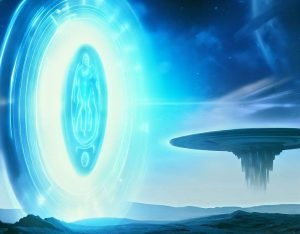Hypothesis of UFOs as Messengers from Our Distant Descendants

 While many explanations have been proposed for the origin and nature of UFOs, ranging from natural phenomena to extraterrestrial visitors, one of the most intriguing and unconventional hypotheses is that UFOs are actually time machines from the future, carrying messages or warnings from our temporal descendants.
While many explanations have been proposed for the origin and nature of UFOs, ranging from natural phenomena to extraterrestrial visitors, one of the most intriguing and unconventional hypotheses is that UFOs are actually time machines from the future, carrying messages or warnings from our temporal descendants.
This hypothesis, which has been advanced by some physicists and philosophers, such as Michael Duff, David Deutsch, and John Gribbin, is based on the assumption that time travel is possible and that some advanced civilization in the distant future has mastered the technology to manipulate space-time and travel to the past.
According to this scenario, UFOs are not alien spacecrafts, but rather probes or vehicles sent by our future selves to communicate with us or to observe our history.
There are several possible motivations for why our temporal descendants would want to visit us or send us messages through UFOs. One possibility is that they are trying to warn us about some impending catastrophe or danger that threatens our existence or the future of humanity.
Another possibility is that they are trying to influence our actions or decisions in order to create a more favorable outcome for themselves or for us. A third possibility is that they are simply curious about their past or want to study our culture and civilization.

Nuclear Warfare: A Grim Catalyst
The Cold War’s ominous shadow looms large in the context of this hypothesis. At the heart of the theory lies the assumption that humanity’s development of nuclear weapons poses an existential threat not only to the present but also to the future.
If advanced civilizations emerge from our lineage, they might possess the capability to traverse time and space, using UFOs as their means of communication.
Proponents of this theory point to the escalation of UFO sightings during pivotal moments in nuclear history, such as the well-documented incident at Malmstrom Air Force Base in 1967, when UFOs reportedly tampered with nuclear missile systems.
Such occurrences have led to speculation that these temporal messengers are imploring us to reconsider our trajectory.
If UFOs are indeed emissaries from the future, their apparent technological superiority becomes more understandable. These craft could embody advancements centuries beyond our current capabilities, reflecting the evolution of science, engineering, and consciousness.
The ability to traverse space-time itself implies a profound comprehension of physics and an expanded consciousness that transcends our present limitations.

Time Travel challenges and objections
Of course, this hypothesis is highly speculative and faces many challenges and objections, both theoretical and empirical. On the theoretical side, one of the main difficulties is to explain how time travel can be consistent with the laws of physics and logic, and how paradoxes and contradictions can be avoided.
For instance, how can we reconcile the idea of changing the past with the principle of causality, which states that effects cannot precede their causes?
How can we prevent the grandfather paradox, which occurs when a time traveler kills his own ancestor and prevents his own existence? How can we account for the fact that we have not received any clear or convincing messages from our temporal descendants through UFOs or other means?
On the empirical side, one of the main challenges is to provide credible and verifiable evidence for the existence and nature of UFOs as time machines. How can we distinguish UFOs from other natural or artificial phenomena that could produce similar observations?

How can we test this hypothesis?
One possible way is to look for anomalies or inconsistencies in the behavior or appearance of UFOs that could indicate their temporal origin. For example, do UFOs show signs of advanced technology that is not available in our present time?
Do UFOs appear in historical records or photographs that predate their supposed invention? Do UFOs exhibit patterns or regularities that could suggest a purpose or a message? These are some of the questions that could help us evaluate the plausibility of the hypothesis that UFOs are from the future.
Besides the time travel hypothesis, there are other possible explanations for UFOs that have been suggested by various researchers and experts. Some of these hypotheses include:
The extraterrestrial hypothesis: This is the most popular and widely accepted hypothesis, which states that UFOs are spacecrafts piloted by intelligent beings from other planets or star systems.
This hypothesis assumes that there are other civilizations in the universe that have developed interstellar travel and have visited Earth for various reasons, such as exploration, observation, contact, or colonization.
The interdimensional hypothesis: This is a less common but still plausible hypothesis, which states that UFOs are manifestations of entities or phenomena from other dimensions or realities.
This hypothesis assumes that there are other realms of existence beyond our physical universe, and that some beings or forces can cross over or interact with our dimension through portals or wormholes. This hypothesis also implies that UFOs may not be physical objects, but rather psychic or paranormal phenomena.
The secret project hypothesis: This is a more skeptical and conspiratorial hypothesis, which states that UFOs are advanced aircrafts or weapons developed by secret military or government agencies.
This hypothesis assumes that there are hidden projects or experiments that involve exotic technologies, such as anti-gravity propulsion, stealth technology, holograms, lasers, or drones. This hypothesis also implies that UFO sightings are either deliberate deceptions or accidental leaks of classified information.

A Call for Deeper Exploration
These are some of the questions and problems that need to be addressed if we want to seriously explore the speculative hypothesis of UFOs as messengers from our temporal descendants.
While this hypothesis may seem far-fetched or implausible to many, it is not entirely impossible or irrational, and it deserves further investigation and discussion.
Whether as cosmic travelers, interdimensional entities, or, as proposed here, messengers from our own future, UFOs continue to defy easy classification.
While the future humans hypothesis fuels intrigue and speculation, it also highlights the profound responsibility that lies within our present moment. If these spectral visitors indeed herald a warning, our ability to avert disaster rests on our willingness to engage in global cooperation, foresight, and a commitment to safeguarding our planet and its inhabitants.
As humanity contemplates its future amidst the stars, the enigmatic presence of UFOs beckons us to peer not only into the heavens but also deep within ourselves. Whether these ethereal apparitions are messengers from the future or remnants of cosmic chance, they serve as a testament to the unquenchable human thirst for discovery and the boundless mysteries that await our exploration.
As Carl Sagan once said, “Extraordinary claims require extraordinary evidence.” Perhaps one day we will find such evidence and discover that UFOs are indeed windows into our future.




